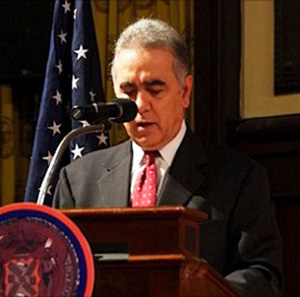BY HARUT SASSOUNIAN
In my last week’s column, I reported that Talaat Pasha, the mastermind of the Armenian Genocide, had told British intelligence officer Aubrey Herbert in 1921 that he had written “a memorandum on the Armenian massacres.”
I would like now to present brief excerpts from Talaat’s lengthy account published in the November 1921 issue of Current History, the monthly magazine of The New York Times, titled: “Posthumous Memoirs of Talaat Pasha,” and subtitled: “The former Grand Vizier’s own account, written shortly before his assassination, of why and how Turkey entered the war — Secret alliance that preceded the conflict — Causes of the Armenian massacres as stated by the man who ordered them.”
In an introductory note, Current History editors explain how they obtained a copy of this revealing report: “…After Talaat’s death, the manuscript passed into the possession of his wife, who remained in Germany; she has not yet published the whole of it, but after the acquittal of her husband’s assassin she permitted the Paris correspondent of Vakit, a liberal Turkish newspaper published in Constantinople, to reproduce the most interesting portions of it. These have been translated from Turkish for Current History by M. Zekeria, a native of Constantinople. They represent about fifty pages of the original manuscript, the opening sentence of which, ‘I do not tell all the truth, but all I tell is truth,’ aroused a great sensation in Turkey.”
In his memoirs, as in his interview with Aubrey Herbert, Talaat tries to exonerate himself by blaming everyone else — Armenians, Russians, even Turks — for the Armenian massacres. He does not deny “the deportations of the Armenians, in some localities of the Greeks, and in Syria of some of the Arabs,” but claims that such reports “were exceedingly exaggerated.” Talaat then adds: “in saying this, I do not mean to deny the facts. I desire only to eliminate the exaggerations and to relate the facts as they occurred.”
The former Grand Vizier confesses: “I admit that we deported many Armenians from our eastern provinces, but we never acted in this matter upon a previously prepared scheme. The responsibility for these acts falls first of all upon the deported people themselves. Russia, in order to lay hand on our eastern provinces, had armed and equipped the Armenian inhabitants of this district, and had organized strong Armenian bandit forces in the said area.”
Attempting to repair his tarnished image, Talaat acknowledges the Turkish brutalities against Armenians: “I admit also that the deportation was not carried out lawfully everywhere. In some places unlawful acts were committed…. Some of the officials abused their authority, and in many places people took preventive measures into their own hands and innocent people were molested. I confess it.”
Continuing his face-saving rhetoric, Talaat concedes: “I confess, also, that the duty of the Government was to prevent these abuses and atrocities or at least to hunt down and punish their perpetrators severely. In many places, where the property and goods of the deported people were looted, and the Armenians molested, we did arrest those who were responsible and punished them according to the law. I confess, however, that we ought to have acted more sternly, opened up a general investigation for the purpose of finding out all the promoters and looters and punished them severely. But we could not do that. Although we punished many of the guilty, most of them were untouched.”
Talaat proceeds to provide excuses for not pursuing perpetrators of the Armenian massacres who “were short-sighted, fanatic, and yet sincere in their belief. The public encouraged them, and they had general approval behind them. They were numerous and strong. Their open and immediate punishment would have aroused great discontent among the people, who favored their acts. An endeavor to arrest and to punish all these promoters would have created anarchy in Anatolia at a time when we greatly needed unity.”
To set the record straight, Talaat’s claims that Armenians stabbed Turkey in the back during WWI are completely false. Minister of War Enver Pasha, Commander-in-Chief of the Ottoman Armed Forces, in a letter to the Bishop of Konya, praised the bravery of Turkish-Armenian soldiers fighting against the Russian Army in the winter of 1914-1915.
Ironically, Talaat’s assertion that his government would have taken brutal actions against Armenians even at “a time of peace,” reconfirms long-standing Turkish genocidal practices as previously demonstrated by the Hamidian and Adana massacres of Armenians which were carried out when there were no wars.
Source: Asbarez
Link: Talaat’s Personal Account of The Armenian Massacres

